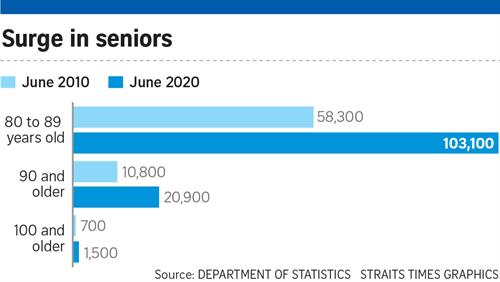Back
Thursday, 01 Oct, 2020
Reaching 100: Number of centenarians in Singapore has doubled in 10 years (Straits Times Premium)
Number of centenarians here has doubled in 10 years, which has implications for society, say experts
.jpg?sfvrsn=c5125dd4_0)
Centenarian Kassim Sultan, pictured above with his wife, Madam Tuminah Haji Siraj, 90, is among the 20,900 Singapore residents aged 90 and older as at June this year, a 94 per cent jump from the 10,800 people in this age group a decade ago. ST PHOTO: DESMOND WEE
The number of centenarians - those aged 100 and above - in Singapore has doubled over the past 10 years, from 700 in June 2010 to 1,500 in June this year.
The figure comprises citizens as well as permanent residents, who are classified as Singapore residents, said a spokesman for the Department of Statistics.
Old folk in their 80s and 90s have also gone up substantially.
The Population Trends 2020 report released last week showed that in June, there were 103,100 Singapore residents aged between 80 and 89. The figure is a 77 per cent increase from the 58,300 seniors in this age group in June 2010.
There were 20,900 Singapore residents aged 90 and older in June, a 94 per cent jump from the 10,800 people in this age group a decade ago.
Experts who study ageing issues say several factors have helped Singaporeans live longer, including advances in medical science and public health services, as well as higher standards of living.
A Singapore resident baby born last year can expect to live till about 84.
One senior who is still going strong in his twilight years spoke to The Straits Times, as the world marks the International Day of Older Persons today. The day was designated by the United Nations.
Mr Kassim Sultan celebrated his 100th birthday on Sept 20.
The centenarian is still sharp as ever - he is able to rattle off the phone numbers of all his 12 children.
Apart from a few minor operations, such as for cataract and hernia, he has had no health woes until recently when he fell down twice at home. He had to be hospitalised and received two stitches on his head.
Mr Kassim, who has 32 grandchildren and 43 great-grandchildren, now walks with the help of a walking frame. The former typing instructor retired when he was 68.
Before those falls, he would walk to the shops every morning to buy a copy of Malay newspaper Berita Harian. He would also go for walks around his Jurong West neighbourhood.
Mr Kassim, who lives with his 90-year-old wife, daughter and son-in-law, would also wash and iron his own clothes.
Asked about his secret to longevity, he said: "The secret is that I don't drink ice water, and haven't for 52 years. Every day, I also wake up to pray at 4am."
He is also a generous man, having donated about $260,000 to various mosques from the sales of two landed properties.
Academics interviewed say the surge of seniors aged 80 and older is significant and rapid.
Singaporeans have the world's longest life expectancy, said Associate Professor Angelique Chan, executive director of the Centre for Ageing Research and Education at Duke-NUS Medical School.
In fact, those aged 80 and older are the fastest-growing segment in Singapore's population, she said. And this surge, which comes as Singapore experiences a persistent baby drought, has serious implications for individuals and Singapore society.
For example, seniors spend more years of their lives in frail health as they live longer, said Prof Chan, citing research such as that done by the centre. More of them are likely to be afflicted with dementia as the proportion of the "oldest old" - as those aged over 85 are called - rises sharply, she said.
With more seniors in frail health and needing care, this places a strain on their and their family's finances and care-giving arrangements, among other things.
She said: "Due to smaller family sizes, the oldest old have fewer family members to rely on for social and financial support."
As lifespans increase, more are also likely to work for a longer period of time, Prof Chan said.
Singapore will raise the retirement age from 62 to 65 by 2030, while the re-employment age will go up from the current age of 67 to 70 by 2030.
Besides raising the retirement age, Ms Peh Kim Choo, chief executive of the Tsao Foundation, feels that more can be done to advocate against ageism in the workplace and in society, as Singaporeans live and work for longer periods of time.
Associate Professor Kang Soon Hock, Singapore University of Social Sciences' vice-dean of the School of Humanities and Behavioural Sciences, noted that the elderly are not a homogeneous group with younger seniors being better educated.
Among other things, many are likely to be active and productive, even in their old age, he said.
Prof Kang said: "While the increases (in those aged 80 and older) may seem alarming to some, it does not necessarily mean doom and gloom."
Institute of Policy Studies senior research fellow Mathew Mathews called for more programmes and services to engage seniors to prevent social isolation, among other things.
As Prof Chan pointed out: "Older persons who have meaning and purpose in their lives, a satisfying social life, a good support system and financial stability are far more likely to remain healthy or recover successfully from health issues.
"This is compared with older adults who are lonely, socially isolated and without financial stability."

Original article on Straits Times (Premium):
Reaching 100: Number of centenarians in Singapore has doubled in 10 years